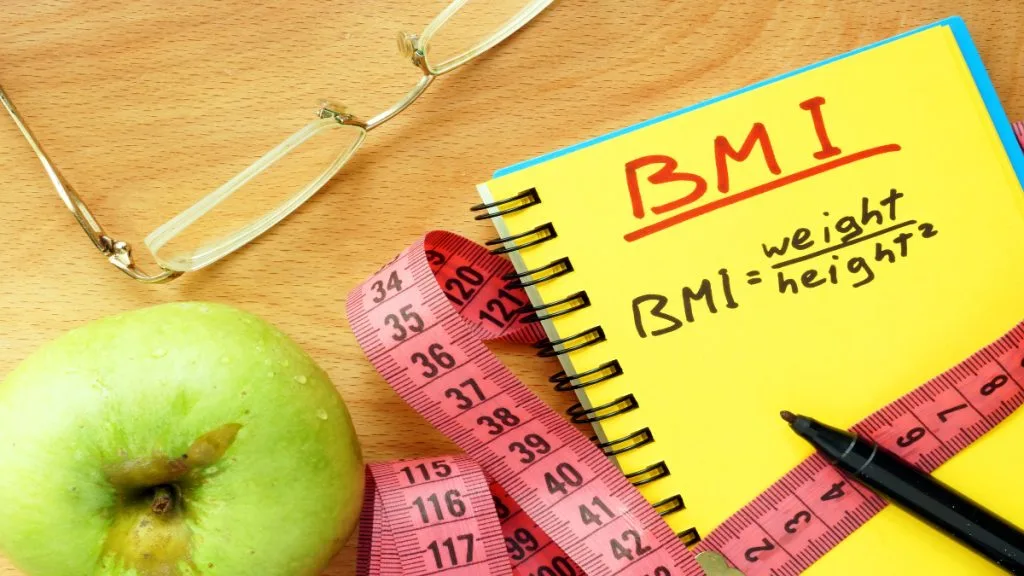A BMI of 30 is considered obese for both males and females. So what should you do if you have a body mass index of 30?
Most people who register a 30 BMI score will need to lose weight in order to improve their health and quality of life. In other words, they’ll need a normal BMI for women and men.
However, some people will also need to gain muscle as well so that they can build a stronger body that’s more resistant to injury and illness.
Related:
How bad is a BMI of 30 for a female?

A BMI of 30 is considered obese for a female even though a body mass index of 30 is actually fairly typical for an adult woman in the US.
Although women naturally have more body fat than men, there comes the point when fat tissue, rather than having a protective effect, can become detrimental. [1]
This is particularly true for women who store a lot of fat around their waist. In this scenario, visceral fat can start to accumulate around organs such as your liver, which can eventually lead to chronic diseases like diabetes.
Is a BMI of 30 unhealthy for a male?

A BMI of 30 is definitely unhealthy for males because having a body mass index of 30 almost certainly means that a man is carrying a dangerously high amount of body fat.
A 30 BMI is particularly bad for men because males have a more central fat storage distribution than females, meaning that they store more adipose tissue around their waists than their legs or hips.
As mentioned, central fat storage is bad because it can lead to the development of visceral fat, which is the dangerous internal fat that wraps around your organs.
Of course, it’s technically possible (but very unlikely) for a man to have a body mass index of 30 while being fairly lean.
However, most men simply cannot pack on this level of muscle mass naturally, and it’s debatable whether being a muscular BMI 30 is even healthy.
As with any kind of body tissue, there comes a point when too much muscle can be detrimental to your health rather than beneficial.
What does BMI 30 look like?

Most of the time, a BMI 30 person looks overweight and borderline obese. The specifics depend on the person’s body composition, i.e., their ratio of fat to muscle.
While an individual can certainly be muscular while having a BMI of thirty, it’s likely that they’ll also have a lot of fat.
On the other hand, it’s also possible for a BMI 30 person to have very little muscle but absolutely loads of fat.
Even if you’re muscular at a BMI of 30, that’s not enough to compensate for the fat that you have, meaning that you should seek to lose weight sustainably in order to improve your health.
BMI 30 scores and grades

A BMI of thirty is the first BMI to be considered obese. The following BMI scores are common among those who are, shall we say, newly obese.
30.1 BMI
A BMI of 30.1, while not that much higher than average, is still considered obese. Anyone with a 30.1 BMI almost certainly needs to lose weight, and likely a substantial amount.
30.2 BMI
A 30.2 BMI means that a person is obese and, therefore, is putting their health in danger. Thankfully, people with a BMI of 30.2 can lose weight via moderate calorie restriction and regular exercise.
30.3 BMI
Those with a 30.3 BMI are classified as obese and should seek to lose weight in a sustainable manner so that they can improve their cardiometabolic health and their fitness levels.
30.4 BMI
If you have a 30.4 BMI, then you’re considered obese for a person of your stature. To lose weight, you’ll need to eat in a calorie deficit and perform regular workouts, which can be cardio-based as well as strength-focused.
30.5 BMI
A 30.5 BMI is comfortably in the obese category, meaning that a person with a BMI of 30.5 is most likely putting their health in jeopardy by maintaining such a high body weight.
30.6 BMI
While there are many people who have a BMI that exceeds 30.6, this kind of body mass is still too high for a person to be healthy. This is because a BMI of 30.6 is indicative of excess adiposity, which is bad for a person’s physical health.
30.7 BMI
If you’ve got a 30.7 BMI, then you should try to lower your body weight over the coming months so that you can reduce your risk of chronic disease.
30.8 BMI
A BMI of 30.8 is excessive for both men and women because it’s not just overweight; it’s obese. While on the lower end of the obese category, a 30.8 BMI should be reduced in the vast majority of cases.
30.9 BMI
If you have a 30.9 BMI, then it’s very likely that you have excess body fat around your stomach and other key areas. As such, weight loss is the way to go, as long as you do it sustainably.
BMI 30 FAQ
Here are some common questions that BMI 30 people have about their weight.
Is a BMI of 30 considered healthy?
No, a BMI of 30 is not considered healthy and is, in fact, considered unhealthy and obese by some of the worlds leading public health authorities.
While body mass index is just a screening tool and not a direct measure of body fatness, it’s almost guaranteed that a BMI 30 individual has far too much body fat.
How can you reduce your BMI from 30 to 25?
To reduce your BMI from 30 to 25, you need to eat in a calorie deficit. So if you usually consume 3,000 daily calories, try to stick to no more than 2,500 calories per day.
Your doctor, whom you should consult before embarking on a weight loss program, may suggest a larger calorie deficit to promote faster initial weight loss so that you can get down to a healthier weight quicker.
Aside from dietary intervention, you’ll want to do a mixture of weight training (to build a strong, resilient body) and cardio to improve your metabolic health and burn extra calories.
Is it common to have a body mass index of 30?
Unfortunately, it is rather common to have a BMI of 30 in today’s world, given the global obesity epidemic.
While some people struggle to lose weight, it’s still possible to achieve a healthy body weight if you have the right mindset (positive) and the know-how (sustainable weight loss is the way to go).
Conclusion: How bad is it for men and women to have a BMI of 30?
All things considered, it’s definitely bad for men and women to have a BMI of 30 because a body mass index of 30 almost certainly means excess adiposity.
A 30 BMI score is considered obese, which can profoundly affect your health in many negative ways. Obese people typically have more joint problems, a higher disease risk, and a low quality of life than their normal-weight counterparts.
References
- Haase, C. L., Lopes, S., Olsen, A. H., Satylganova, A., Schnecke, V., & McEwan, P. (2021). Weight loss and risk reduction of obesity-related outcomes in 0.5 million people: evidence from a UK primary care database. International journal of obesity (2005), 45(6), 1249–1258. https://doi.org/10.1038/s41366-021-00788-4
- https://www.bhf.org.uk/informationsupport/heart-matters-magazine/news/behind-the-headlines/weight-loss

